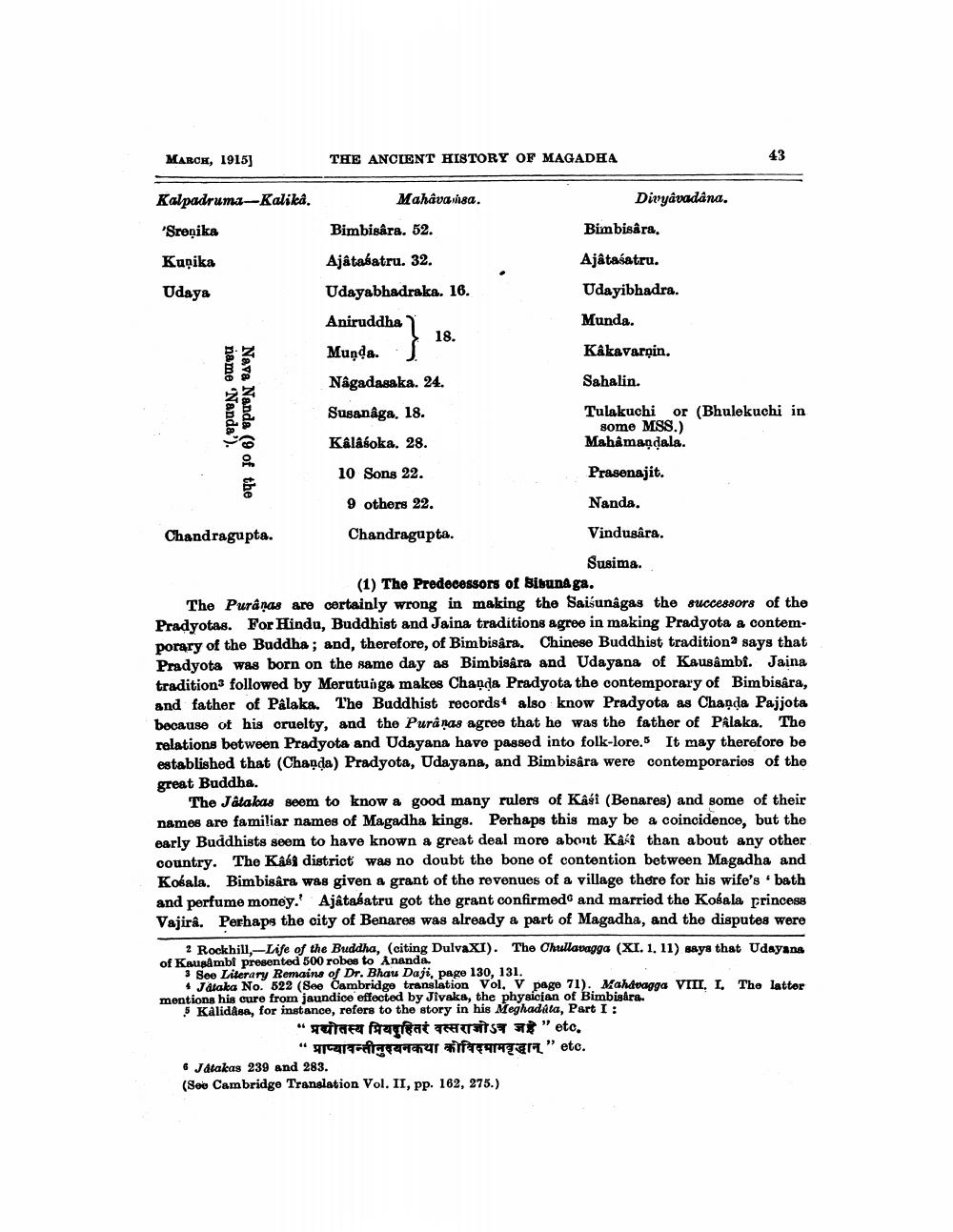________________
MARCH, 1915]
Kalpadruma-Kalika.
'Sreņika
Kunika
Udaya
17
name 'Nanda'). Nava Nanda (9 of the
Chandragupta.
THE ANCIENT HISTORY OF MAGADHA
Mahâvansa.
Bimbisâra. 52.
Ajâtaśatru. 32.
Udayabhadraka. 16.
Aniruddha
"}
Munda.
18.
Nâgadasaka. 24.
Susanâga, 18.
Kâlâśoka. 28.
10 Sons 22.
9 others 22.
Chandragupta.
Divyavadana.
43
Bimbisâra.
Ajitaiatru.
Udayibhadra.
Munda.
Kâkavargin.
Sahalin.
Tulakuchi or (Bhulekuchi in
some MSS.) Mahamandala.
Prasenajit.
Nanda.
Vindusâra.
Susima.
(1) The Predecessors of Bibunaga.
The Puranas are certainly wrong in making the Saisunâgas the successors of the Pradyotas. For Hindu, Buddhist and Jaina traditions agree in making Pradyota a contemporary of the Buddha; and, therefore, of Bimbisâra. Chinese Buddhist tradition says that Pradyota was born on the same day as Bimbisâra and Udayana of Kausâmbî. Jaina tradition3 followed by Merutunga makes Chanda Pradyota the contemporary of Bimbisâra, and father of Pâlaka. The Buddhist records also know Pradyota as Chanda Pajjota because of his cruelty, and the Puranas agree that he was the father of Palaka. The relations between Pradyota and Udayana have passed into folk-lore. It may therefore be established that (Chanda) Pradyota, Udayana, and Bimbisâra were contemporaries of the great Buddha.
The Jatakas seem to know a good many rulers of Kâsi (Benares) and some of their names are familiar names of Magadha kings. Perhaps this may be a coincidence, but the early Buddhists seem to have known a great deal more about Kâsî than about any other country. The Kasi district was no doubt the bone of contention between Magadha and Kosala. Bimbisâra was given a grant of the revenues of a village there for his wife's ⚫ bath and perfume money.' Ajâtaśatru got the grant confirmed and married the Kosala princess Vajira. Perhaps the city of Benares was already a part of Magadha, and the disputes were
2 Rockhill,-Life of the Buddha, (citing DulvaXI). The Chullavagga (XI. 1. 11) says that Udayana of Kausâmbi presented 500 robes to Ananda.
3 See Literary Remains of Dr. Bhau Daji, page 130, 131.
" प्रद्योतस्य प्रियदुहितरं वत्सराजोऽत्र जड़े " etc.
* SZIKRİBLEPEar infeamgær," etc.
6 Játakas 239 and 283.
(See Cambridge Translation Vol. II, pp. 162, 275.)
Jataka No. 522 (See Cambridge translation Vol. V page 71). Mahavagga VIII, I. The latter mentions his cure from jaundice effected by Jivaka, the physician of Bimbisára.
5 Kalidasa, for instance, refers to the story in his Meghadata, Part I:




